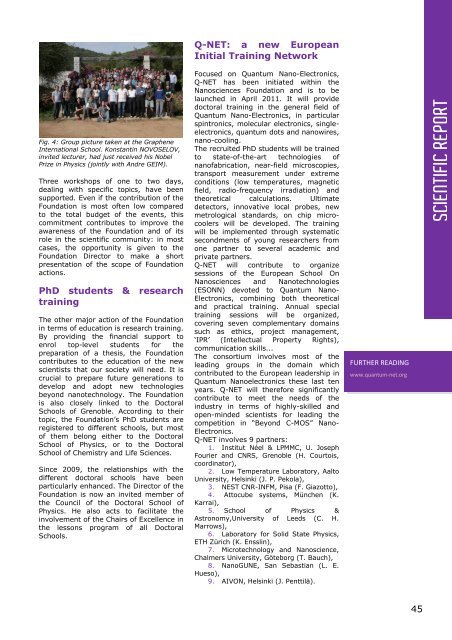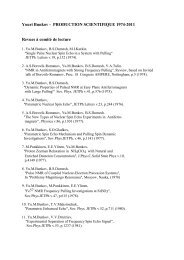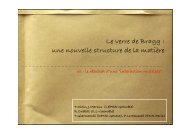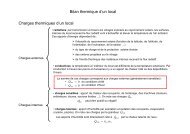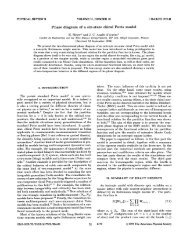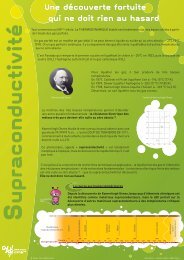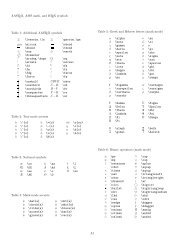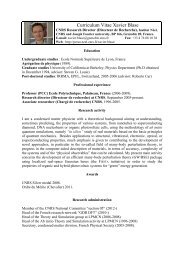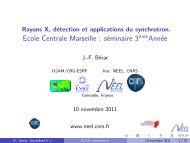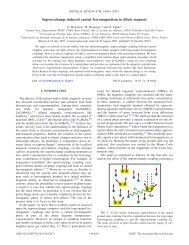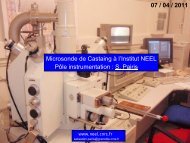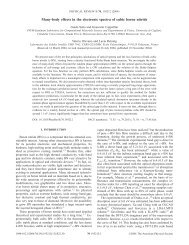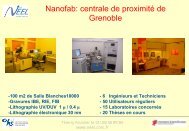Activity Report 2010 - CNRS
Activity Report 2010 - CNRS
Activity Report 2010 - CNRS
Create successful ePaper yourself
Turn your PDF publications into a flip-book with our unique Google optimized e-Paper software.
Q-NET: a new European<br />
Initial Training Network<br />
Fig. 4: Group picture taken at the Graphene<br />
International School. Konstantin NOVOSELOV,<br />
invited lecturer, had just received his Nobel<br />
Prize in Physics (jointly with Andre GEIM).<br />
Three workshops of one to two days,<br />
dealing with specific topics, have been<br />
supported. Even if the contribution of the<br />
Foundation is most often low compared<br />
to the total budget of the events, this<br />
commitment contributes to improve the<br />
awareness of the Foundation and of its<br />
role in the scientific community: in most<br />
cases, the opportunity is given to the<br />
Foundation Director to make a short<br />
presentation of the scope of Foundation<br />
actions.<br />
PhD students & research<br />
training<br />
The other major action of the Foundation<br />
in terms of education is research training.<br />
By providing the financial support to<br />
enrol top-level students for the<br />
preparation of a thesis, the Foundation<br />
contributes to the education of the new<br />
scientists that our society will need. It is<br />
crucial to prepare future generations to<br />
develop and adopt new technologies<br />
beyond nanotechnology. The Foundation<br />
is also closely linked to the Doctoral<br />
Schools of Grenoble. According to their<br />
topic, the Foundation’s PhD students are<br />
registered to different schools, but most<br />
of them belong either to the Doctoral<br />
School of Physics, or to the Doctoral<br />
School of Chemistry and Life Sciences.<br />
Since 2009, the relationships with the<br />
different doctoral schools have been<br />
particularly enhanced. The Director of the<br />
Foundation is now an invited member of<br />
the Council of the Doctoral School of<br />
Physics. He also acts to facilitate the<br />
involvement of the Chairs of Excellence in<br />
the lessons program of all Doctoral<br />
Schools.<br />
Focused on Quantum Nano-Electronics,<br />
Q-NET has been initiated within the<br />
Nanosciences Foundation and is to be<br />
launched in April 2011. It will provide<br />
doctoral training in the general field of<br />
Quantum Nano-Electronics, in particular<br />
spintronics, molecular electronics, singleelectronics,<br />
quantum dots and nanowires,<br />
nano-cooling.<br />
The recruited PhD students will be trained<br />
to state-of-the-art technologies of<br />
nanofabrication, near-field microscopies,<br />
transport measurement under extreme<br />
conditions (low temperatures, magnetic<br />
field, radio-frequency irradiation) and<br />
theoretical calculations. Ultimate<br />
detectors, innovative local probes, new<br />
metrological standards, on chip microcoolers<br />
will be developed. The training<br />
will be implemented through systematic<br />
secondments of young researchers from<br />
one partner to several academic and<br />
private partners.<br />
Q-NET will contribute to organize<br />
sessions of the European School On<br />
Nanosciences and Nanotechnologies<br />
(ESONN) devoted to Quantum Nano-<br />
Electronics, combining both theoretical<br />
and practical training. Annual special<br />
training sessions will be organized,<br />
covering seven complementary domains<br />
such as ethics, project management,<br />
‘IPR’ (Intellectual Property Rights),<br />
communication skills...<br />
The consortium involves most of the<br />
leading groups in the domain which<br />
contributed to the European leadership in<br />
Quantum Nanoelectronics these last ten<br />
years. Q-NET will therefore significantly<br />
contribute to meet the needs of the<br />
industry in terms of highly-skilled and<br />
open-minded scientists for leading the<br />
competition in “Beyond C-MOS” Nano-<br />
Electronics.<br />
Q-NET involves 9 partners:<br />
1. Institut Néel & LPMMC, U. Joseph<br />
Fourier and <strong>CNRS</strong>, Grenoble (H. Courtois,<br />
coordinator),<br />
2. Low Temperature Laboratory, Aalto<br />
University, Helsinki (J. P. Pekola),<br />
3. NEST CNR-INFM, Pisa (F. Giazotto),<br />
4. Attocube systems, München (K.<br />
Karrai),<br />
5. School of Physics &<br />
Astronomy,University of Leeds (C. H.<br />
Marrows),<br />
6. Laboratory for Solid State Physics,<br />
ETH Zürich (K. Ensslin),<br />
7. Microtechnology and Nanoscience,<br />
Chalmers University, Göteborg (T. Bauch),<br />
8. NanoGUNE, San Sebastian (L. E.<br />
Hueso),<br />
9. AIVON, Helsinki (J. Penttilä).<br />
FURTHER READING<br />
www.quantum-net.org<br />
SCIENTIFIC REPORT<br />
45


